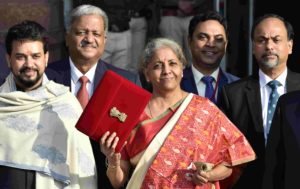A list of dos and don’ts, including disclaimers and penalties, for social media influencers is being chalked out the Union government and the guidelines are set to be announced soon.
The thriving community of individuals and companies working in the social media business is contemplating the challenges of a more regulated’ future.
So whether it is podcast host Vedant Kaushik or marketing agency Pulp Strategy — the two ends of the influencer spectrum working towards pushing trends with their endorsement of products ranging from makeup to movies — both welcome the move to streamline the sector.
The Advertising Standards Council of India (ASCI) pegs the social media influencer industry at USD 150 million (approx Rs 1,200 crore).
The proposed guidelines will eradicate in one go the vagueness on whether a piece of content is sponsored or not… “We have laws and standards for TV, films, radio, etc. why not for the modern medium of social media, Kaushik, who has nearly 60,000 followers on Instagram,” told PTI.
A certain adjustment time may see some chaos. In the long run, this will lead to more responsible behaviour in the digital marketing ecosystem, added Ambika Sharma, Pulp Strategy’s founder and managing editor.
The Department of Consumer Affairs is expected to come out with guidelines for the community in the next few days, sources said. Influencers with large followers on social media platforms such as Instagram are endorsing products after taking payments from brands, they explained.
Soon, however, they will be required to put a disclaimer in their posts when they endorse a brand or are paid by a brand for promotion, the sources said. Violation of these guidelines might attract hefty penalties.
An influencer can be any person with a significant following on a social media platform. A product or brand endorsed, used or reviewed by the individual who holds considerable sway or influence’ over his followers, is what constitutes influencer marketing. Influencer marketing agencies such as Pulp Strategy connect influencers to companies and create strategies for them.
The penalties are reportedly in the range of Rs 10 lakh-50 lakh, said influencer-turned-entrepreneur Gaurav Jain.
“I think creators will be fined in accordance with their audience size and the kind of brand they’ve worked with. But I still feel mostly bigger celebrities and macro creators will fall under their radar in case of non-compliance,” Jain explained.
According to influencers and marketing agencies, the fear of heavy fines and possible litigation may pose some challenges, especially to smaller creators, initially. However, in the longer run, the guidelines will help formalise the industry and make brands and creators more responsible towards consumers.
Karan Pherwani of influencer marketing agency Chtrbox said the guidelines will cultivate long-term trust between the brand, influencer and their followers.
There’s no reason why audiences should not know when digital celebrities endorse a brand. In both cases, advertising when done well is just as impactful for the brand. Selecting the right celebrity and influencer, and having a strong brand alignment is key. Brand endorsement disclosures only further convey that the creator appreciates the brand enough to partner with it, Pherwani, director, creator solutions, Chtrbox, said.
Pulp Strategy’s Sharma agreed.
The guidelines may scare smaller influencers to begin with will benefit in the long term.
In her view, the rules are neither difficult to follow nor unreasonable.
The growing influencer marketing segment can cater to a wide gamut of industries, including fashion, food, cosmetics, design, technology and entertainment.
An influencer can earn from as small as a few thousands to lakhs of rupees, based on the brand, the creator’s reach and the quality of content, Jain explained.
Fitness coach and influencer Meenal Bhardwaj Pathak, who has more than one lakh followers on Instagram, said guidelines and penalties will instil a sense of moral and social responsibility in creators.
I think this is the right way of pushing these changes. When you know a product is being endorsed by a creator, you use your own discretion before buying it. And the provision of a fine will only teach creators to be more responsible towards their followers, Pathak said.
It is actually a great way in my opinion for building more trust between creators and audiences. The influencer marketing space has been growing, and exponentially. While it’s a great thing, it also leaves a lot of scope and potential for misinformation and exploitation of the unaware audience that spend a lot of time watching online content, Kaushik said.
Last year, the ASCI released the Guidelines For Influencer Advertising In Digital Media’ that mandated influencers on social media who advertise brands from their accounts to disclose paid partnerships.
The ASCI guidelines were a good starting point for the discussion to begin, Kaushik said.
Though there is general optimism that the proposed guidelines from the government will streamline the industry, some fear their influence’ will weaken.
Jain, who now runs an influencer marketing agency Creators Gram, said the fear of losing followers often makes creators hide their paid association with a brand in a post.
At times the audience feel kind of cheated, misled after realising they were watching an advertisement and not regular content. But if it is clearly mentioned that it is a paid promotion, then it is the viewer’s decision if they really want to see that content. They will have more choices, Jain said.
Influencers and marketing agencies alike are of the view that the penalty amount being speculated on right now seems unreasonable and on the higher side for the offence committed.
Fashion influencer Isha Borah, who has more than 10 lakh followers on Instagram, said penalties should be based on a creator’s earning and not a predefined amount.
I think it may be a bit too much for nano and micro-influencers who may not be making a lot of money through brand promotions. I think it should be based on their total earnings through paid collaborations rather than a flat sum, Borah said.
With PTI inputs
Instagram: instagram.com/thepatriot_in/
Twitter: twitter.com/Patriot_Delhi
Facebook: facebook.com/Thepatriotnewsindia





